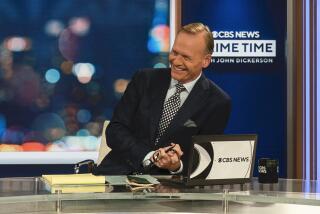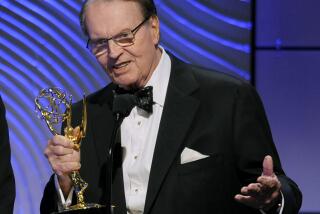CHARLES OSGOOD: His Personal News Slant
- Share via
Since 1971, Charles Osgood has offered up witty, acute and often poetic observations to radio and television audiences about his life, his family and the world in general. He does so as a news correspondent for CBS.
Osgood, who also sports dapper bow ties, writes and anchors “The Osgood File” four times daily for CBS Radio, co-anchors the “CBS Morning News” and does regular features on “CBS Evening News,” “CBS This Morning” and “Sunday Morning.” Osgood also manages to find the time to write a twice-weekly newspaper column for Tribune Media Services.
His just-published book “The Osgood Files” ($19.95, G.P. Putnam’s Sons) features 98 pieces from his syndicated column, covering such subjects as his family’s rather nauseating trip to Disney World and the disclosure that President and First Lady Bush throw their wet towels on the floor after they bathe.
Osgood talked to Susan King during a whirlwind visit to Los Angeles.
Is it true that with your busy schedule you actually live at CBS in New York?
I really don’t. I get up really early in the morning and I am there by 4 in the morning. I live in New Jersey and the only advantage of working those hours is there is no traffic in the morning. I do the “CBS Morning News” on TV and I do four radio shows. The broadcast of the “Morning News” on TV coincides with the first radio broadcast, so I have to write it and record the radio show before I go into the television studio. And then I go back and forth doing commentaries and news blocks for television and the four “Osgood Files” for the radio.
Do you prefer radio to television?
To tell you the truth, I like radio better. Television is wonderful and I don’t mean to take anything away from it, but the fact is that a TV picture is very literally “what you see is what you get.”
I think everybody sees the same thing on the television screen, but if you have 12 million listening in on radio, and that’s the number they kick around as the audience for the “Osgood File,” then you get 12 million different pictures. You bring your own experience and emotions to radio that you don’t to television. I do think that radio is more visual. It’s a paradox but it’s true.
I find that I come across better on radio. People have told me that’s true. I did radio for years before I started doing TV, and when I started doing TV people would say, “Why don’t you do the television the way you do the radio? You are really good on radio, but you are different on TV.” I think that’s because I didn’t look the way they expected me to look. They thought I would look some other way than I really do. I look a lot better on radio.
A lot of your pieces deal with your family life and other personal experiences. Do you also get inspiration from newspapers and magazines?
Even if I don’t do a piece about that day’s top breaking story, and usually I don’t, it’s important for me to know what that top story is so you are not talking in a vacuum. I am on news stations so people are aware of what is going on and I have to be aware of it, too. Other times I will take a breaking story, but instead of just giving all the facts of a breaking story, which is what you do on a newscast, I will look for some way of isolating a particular aspect of it and talking about it in a humorous way. I hate stories that are just all numbers.
Did you know you wanted to be involved in broadcasting as a child?
As a kid I certainly remember listening to news on the radio, but I didn’t think that was what I was going to do. I didn’t major in journalism and I didn’t major in broadcasting. I went to Fordham and majored in economics, but there was a radio station there and I spent all my spare time at the radio station. I didn’t do any news at all, but I did a show where I played the piano and played some records.
Did you begin your professional radio career right out of college?
I went right to work for a classical musical station in Washington called WGMS. I was an announcer. I learned a lot doing that.
I was about to be drafted in the Army, this was 1954, and I ran into a guy while I was having dinner with a friend of mine and he was dressed in a white uniform, the most fancy uniform this side of the Ritz Hotel. It turned out he was the announcer for the United States Army Band. I asked him when he was getting out and he said within the next few weeks, so the next morning I was parked out at the commanding officer’s office. He was impressed with the fact I could pronounce Rimsky-Korsakov. That’s how I got the job. I spent three years with the United States Army Band. It was a great experience. My roommate was a man called John Cacavas, and he and I wrote a lot of songs together.
Were any of your songs published?
Yes, and one of them was a hit. You might have even heard of it. Do you remember the senator from Illinois, Everett McKinley Dirkson? One of the songs we wrote, “Gallant Men,” he narrated the lyrics. It got to be a hit (in 1967). It even won a Grammy for best spoken recording.
As a matter of fact, in the film “Easy Rider,” Dennis Hopper and Peter Fonda ride into town on their “Easy Rider” cycles and there is a parade marching down the street. They sort of disrupt the parade and they get arrested. The band is playing “Gallant Men.” So every time “Easy Rider” plays in Europe, I get 4 cents.
“CBS Morning News” airs Monday-Fridays at 6:30 a.m. on KCBS; “The Osgood File” is heard four times daily on KNX Radio Monday-Friday at 6:25 a.m., 7:25 a.m., 8:25 a.m. and 9:25 a.m. and Saturday (repeats) at 5:25 a.m., 6:25 a.m., 7:25 a.m. and 8:25 a.m.
More to Read
The biggest entertainment stories
Get our big stories about Hollywood, film, television, music, arts, culture and more right in your inbox as soon as they publish.
You may occasionally receive promotional content from the Los Angeles Times.











